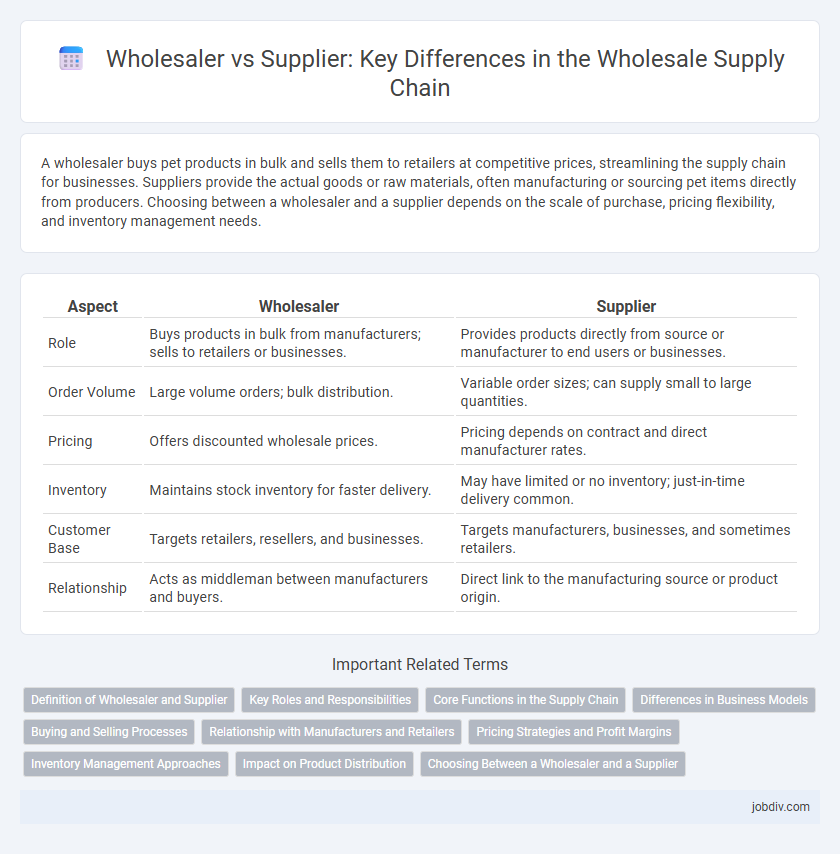A wholesaler buys pet products in bulk and sells them to retailers at competitive prices, streamlining the supply chain for businesses. Suppliers provide the actual goods or raw materials, often manufacturing or sourcing pet items directly from producers. Choosing between a wholesaler and a supplier depends on the scale of purchase, pricing flexibility, and inventory management needs.
Table of Comparison
| Aspect | Wholesaler | Supplier |
|---|---|---|
| Role | Buys products in bulk from manufacturers; sells to retailers or businesses. | Provides products directly from source or manufacturer to end users or businesses. |
| Order Volume | Large volume orders; bulk distribution. | Variable order sizes; can supply small to large quantities. |
| Pricing | Offers discounted wholesale prices. | Pricing depends on contract and direct manufacturer rates. |
| Inventory | Maintains stock inventory for faster delivery. | May have limited or no inventory; just-in-time delivery common. |
| Customer Base | Targets retailers, resellers, and businesses. | Targets manufacturers, businesses, and sometimes retailers. |
| Relationship | Acts as middleman between manufacturers and buyers. | Direct link to the manufacturing source or product origin. |
Definition of Wholesaler and Supplier
A wholesaler is an intermediary business entity that purchases large quantities of goods from manufacturers or suppliers to resell them in smaller quantities to retailers or other businesses. Suppliers are companies or individuals that provide raw materials, components, or finished products directly to manufacturers, wholesalers, or retailers. The fundamental difference lies in wholesalers acting primarily as distributors in the supply chain, while suppliers are the original source or producer of the products.
Key Roles and Responsibilities
Wholesalers primarily focus on purchasing large quantities of goods from suppliers and distributing them to retailers or businesses, managing inventory and logistics to ensure product availability. Suppliers are responsible for manufacturing or sourcing products, maintaining quality control, and fulfilling orders placed by wholesalers or direct customers. Both wholesalers and suppliers play crucial roles in the supply chain, with wholesalers acting as intermediaries and suppliers ensuring product creation and timely delivery.
Core Functions in the Supply Chain
Wholesalers primarily purchase large quantities of products from manufacturers or suppliers and redistribute them in smaller quantities to retailers or other businesses, facilitating efficient product flow and inventory management. Suppliers focus on producing or sourcing raw materials and finished goods, ensuring consistent product availability and quality for the supply chain. The core function of wholesalers centers on distribution and logistics, while suppliers concentrate on production and procurement within the supply chain ecosystem.
Differences in Business Models
Wholesalers operate by purchasing large quantities of products from manufacturers or suppliers and reselling them to retailers or other businesses, focusing on inventory management and distribution efficiency. Suppliers, often synonymous with manufacturers, produce goods or source products directly, emphasizing production quality and product availability. The primary distinction lies in wholesalers acting as intermediaries optimizing bulk sales and logistics, whereas suppliers engage in creation and initial sourcing within the supply chain.
Buying and Selling Processes
Wholesalers purchase products in bulk from suppliers and sell them in smaller quantities to retailers, streamlining the distribution chain. Suppliers manufacture or source goods and provide them directly to wholesalers or sometimes retail businesses, focusing on large-scale production and inventory management. The buying process for wholesalers involves negotiating bulk prices and managing logistics, while suppliers concentrate on production efficiency and meeting wholesale demand.
Relationship with Manufacturers and Retailers
Wholesalers act as intermediaries between manufacturers and retailers, purchasing large quantities of products to distribute in smaller volumes, which helps manufacturers focus on production while enabling retailers to access diverse inventory efficiently. Suppliers often have direct relationships with manufacturers, providing raw materials or finished goods, and may sell both to wholesalers and retailers depending on the industry structure. The wholesaler's role centers on streamlining distribution and inventory management, whereas suppliers primarily focus on product sourcing and manufacturing partnerships.
Pricing Strategies and Profit Margins
Wholesalers focus on buying bulk products from suppliers at discounted rates, allowing them to implement pricing strategies that balance competitive resale prices with sustainable profit margins. Suppliers set base production costs and establish wholesale prices influenced by manufacturing expenses, market demand, and distribution channels, which directly impact the margin wholesalers can achieve. Understanding the dynamic between supplier pricing and wholesaler markup strategies is essential for optimizing profitability in the wholesale supply chain.
Inventory Management Approaches
Wholesalers typically manage large volumes of diverse products, employing inventory management systems such as just-in-time (JIT) and economic order quantity (EOQ) to balance stock levels and reduce holding costs. Suppliers focus on maintaining raw material or component inventories, often using demand forecasting and vendor-managed inventory (VMI) strategies to ensure timely replenishment and avoid stockouts. Efficient inventory management in wholesaling prioritizes turnover rates and bulk purchasing discounts, while suppliers emphasize production schedules and lead time optimization.
Impact on Product Distribution
Wholesalers play a critical role in product distribution by purchasing large quantities from suppliers and breaking them down into smaller units for retailers, thus facilitating wider market reach and inventory management. Suppliers focus primarily on manufacturing or sourcing products, ensuring production quality and availability, which directly affects the supply chain's efficiency and product flow. The collaboration between wholesalers and suppliers optimizes distribution networks, reducing delivery times and enhancing product accessibility across different regions.
Choosing Between a Wholesaler and a Supplier
Choosing between a wholesaler and a supplier depends on the scale and specificity of your business needs. Wholesalers typically offer bulk quantities at discounted prices, ideal for retailers seeking large inventory turnover, while suppliers provide more specialized products with customizable options for niche markets. Understanding your demand volume and product requirements ensures selecting the right partner that maximizes cost-efficiency and supply chain reliability.
Wholesaler vs Supplier Infographic

 jobdiv.com
jobdiv.com